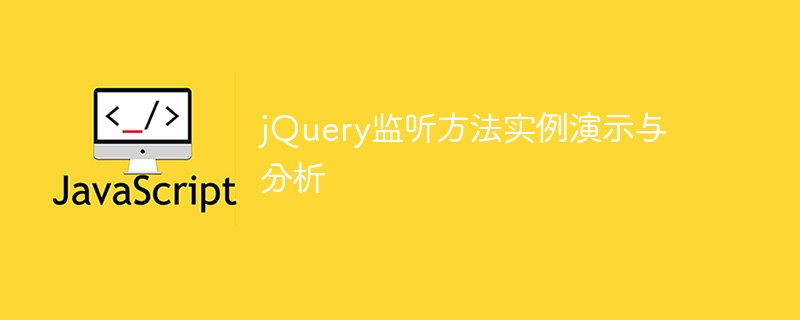

jQuery is a very popular JavaScript library used to simplify DOM operations, event handling, animation effects and other functions in web development. Among them, the listening method is one of the very important and commonly used functions in jQuery, which can perform specific operations when specific events occur. This article will introduce the usage and implementation of the jQuery listening method through specific example demonstrations and analysis.
In jQuery, the listening methods mainly include .on(), .click(), . Change(), .submit() and other methods are used to monitor the occurrence of various events. By binding listening methods, we can trigger corresponding operations when specific events occur, thereby achieving some interactive effects or logic control.
Next we will demonstrate the use of the jQuery listening method through a specific example. Suppose we have a button. When the button is clicked, a prompt box pops up. The sample code is as follows:
<!DOCTYPE html>
<html>
<head>
<title>jQuery监听方法实例演示</title>
<script src="https://code.jquery.com/jquery-3.6.0.min.js"></script>
</head>
<body>
<button id="btn">点击我</button>
<script>
$(document).ready(function(){
$("#btn").click(function(){
alert("你点击了按钮!");
});
});
</script>
</body>
</html>In the above code, when the page is loaded, jQuery will bind the click event Go to the button element with id btn. When the user clicks the button, a prompt box will pop up, prompting the user "You clicked the button!".
In addition, in actual development, in order to improve performance and simplify code, event delegation can be used to handle events. Event delegation binds events to its parent element, uses the event bubbling principle to capture events on the parent element, and then triggers corresponding operations based on the event source.
The following is an example code of event delegation:
<!DOCTYPE html>
<html>
<head>
<title>jQuery事件委托示例</title>
<script src="https://code.jquery.com/jquery-3.6.0.min.js"></script>
</head>
<body>
<ul id="list">
<li>列表项1</li>
<li>列表项2</li>
<li>列表项3</li>
</ul>
<script>
$(document).ready(function(){
$("#list").on("click", "li", function(){
alert($(this).text());
});
});
</script>
</body>
</html>In the above code, we bind the click event to the id list on the ul element and listen to the click event of the li element. When any li element is clicked, the text content of the li element will pop up.
Through the above example demonstration and analysis, we have learned how to use the jQuery listening method to achieve event processing and interactive effects. By binding the listening method, various interactive functions can be easily implemented, improving user experience and enhancing web page functions. I hope this article will help you understand the jQuery listening method. Welcome to continue learning and exploring more jQuery usage and techniques.
The above is the detailed content of Demonstrate and analyze examples of jQuery listening methods. For more information, please follow other related articles on the PHP Chinese website!